Leadership program feM-LEAD
Potential, unlocked
What does leadership mean today? feM-LEAD, the joint leadership program of PSI, Empa, Eawag and WSL, gives women the tools and space to explore that question – and to advance their careers in the process. In September, 20 participants, among them six from Empa, successfully wrapped up the fifth edition of the program.
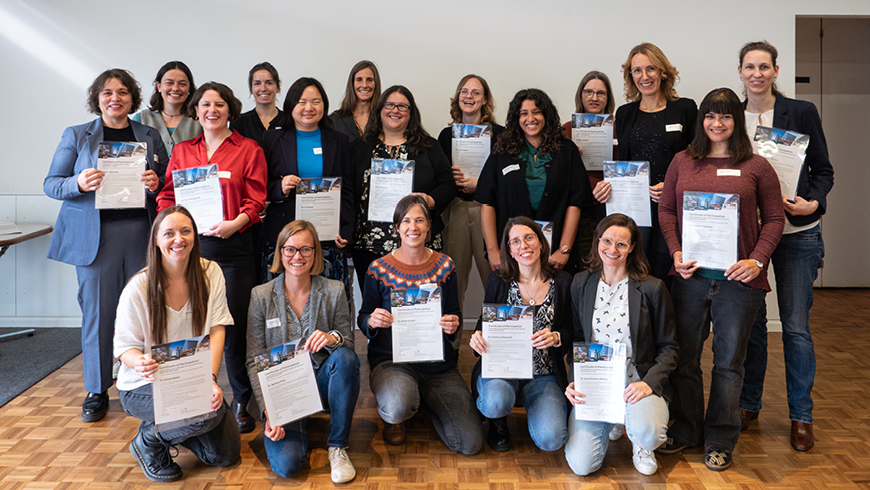
Diverse management teams are more innovative and productive – yet the proportion of women in leadership positions in Switzerland remains relatively low. Ongoing efforts in the ETH Domain aim to improve gender balance in all its institutions, for example by increasing the proportion of women at managerial level and in decision-making bodies. A specific measure is the feM-LEAD program, which encourages participants to consider the option of taking on a leadership role in the future. In this one-year program, participants expand their knowledge of what leadership means, what the potential opportunities, challenges, and required skills are, and what steps can be taken when aspiring to take on a leadership position. The participants – or 'mentees' – are supported through personal mentoring, workshops and peer coaching.
What are important factors for success? Role models, visibility and self-confidence, to name a few. "When women experience that their perspectives are valued and encouraged, they develop self-confidence. And it is precisely this self-confidence that is often the key to taking that next step mentally. As a mentor, I have already seen this spark ignite twice," says Manfred Heuberger, member of Empa's directorate. The fact that feM-LEAD is also impactful beyond the individual support of the mentees is also evident. Nathalie Casas, who is herself a mentor and member of Empa's directorate, explains: "feM-LEAD gives mentees access to a network in which self-confidence, personal development and often even friendships are formed. For me, networking is very enriching – conversations bring new perspectives and food for thought, also for my own leadership role. Such programs not only empower individual women, but Empa as a whole."
Sandra Bürgi, Executive Project Manager
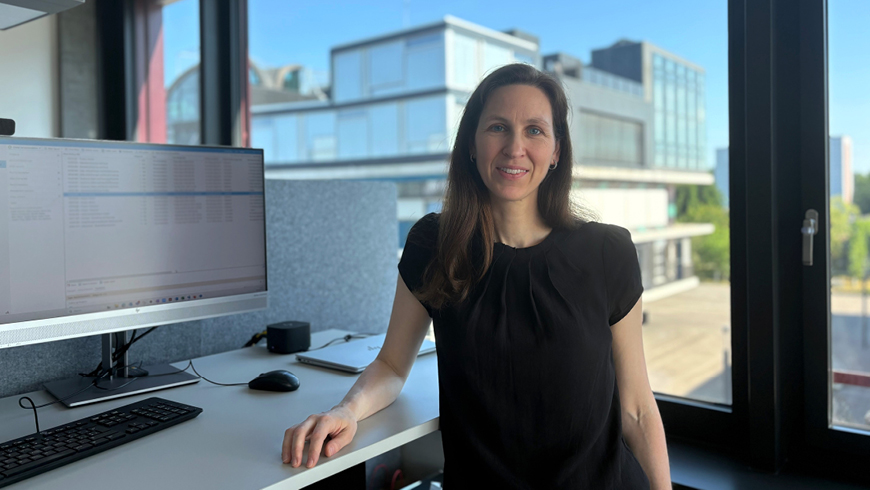
What have you achieved or particularly valued in your career so far and why did you decide to apply for feM-LEAD?
I bring structure to complexity – whether in organizational realignments, intricate coordination processes, or preparing decision-critical information for the directorate. To move beyond the status quo, I develop creative strategies that unlock fresh perspectives. A strong network that spans institutional boundaries, combined with open dialogue across all levels of the organization, are key success factors for me.
I joined the feM-LEAD program to deepen my understanding of leadership and to actively shape my personal development – particularly attracted by the mentoring and the inspiring exchange with like-minded women. The insights I gained have broadened my leadership perspective and helped me define my next steps with greater clarity and focus.
What ambition, vision, motivation or new insight do you leave the feM-LEAD program with?
The program has provided me with valuable new perspectives on leadership and strengthened my resolve to consciously take on responsibility. I realized how essential it is to act with presence and natural authority in order to create real impact and generate space for effective contribution. My vision is to see leadership as an opportunity to create meaningful impact and to live it with conviction.
Paula de Navascués, Plasma scientist
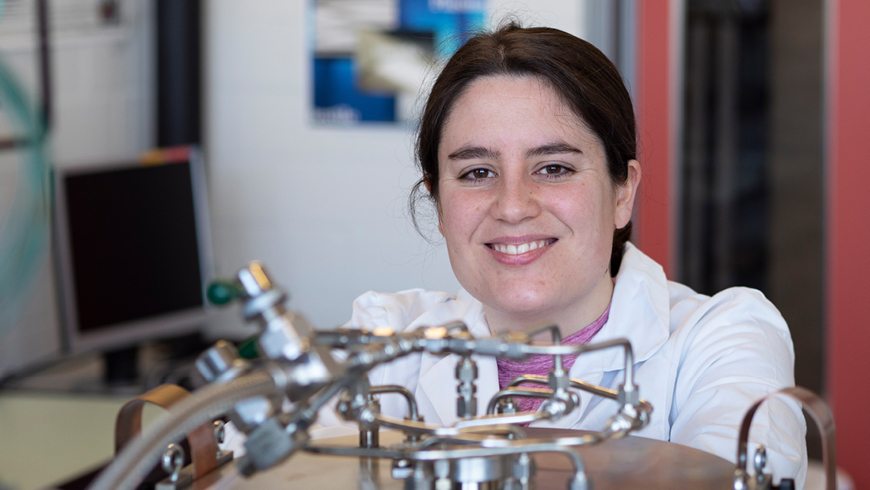
What have you achieved or particularly valued in your career so far and why did you decide to apply for feM-LEAD?
My motivation is to contribute to sustainability and combat climate change, a responsibility my generation must uphold to create an affordable, fair world. Plasma science and technology represent a rich platform for working towards sustainable goals from many directions, with no room for giving up and always pushing innovation. I’m grateful that my research bridges fundamental science and practical applications, enabling me to grow both as a physicist and an engineer.
I believe I can inspire others with my passion, which is why I applied to the feM-LEAD program to explore my potential as a scientific leader. A new generation of leaders in science is needed, one that demonstrates that it is possible to think outside the box while also prioritizing health and life beyond work.
What ambition, vision, motivation or new insight do you leave the feM-LEAD program with?
This program has taught me invaluable knowledge and prompted me to ask myself questions I never consciously did. I now know I want to become a leader who builds trust, serves as a role model, inspires others, and promotes a democratic environment. I want my team to work towards a common goal, with all members shining through their unique strengths.
Barbara Putz, Materials scientist
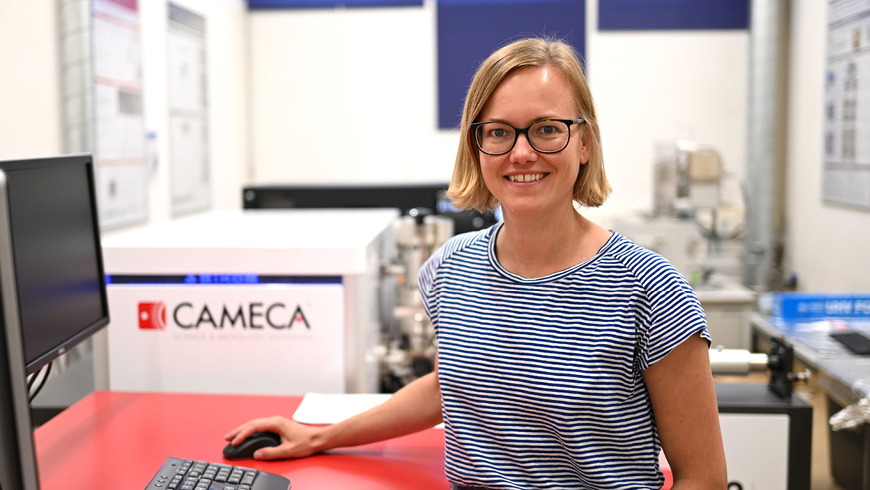
What have you achieved or particularly valued in your career so far and why did you decide to apply for feM-LEAD?
I particularly value and enjoy the multidisciplinary character of my subject and how one specific material can be researched and used for different applications. Metal-polymer composites, the material of my MSc thesis that dominates my research until today, are equally interesting for the microelectronics industry and space exploration. This leads me to collaborate with global players in the microelectronics industry, the European Space Agency, and international academics alike.
My scientific excellence has allowed me to build my own small research group (most notably ERC Starting Grant 2024) and supervise students on functional and sustainable material solutions for diverse applications. I perceive this as a very enjoyable and rewarding task – challenging at times – and consider educating myself further in leadership topics as a personal priority at this stage of my career. The feM-LEAD program offered a valuable opportunity to help me become the modern, fair, and inclusive leader I envisage myself to be.
What ambition, vision, motivation or new insight do you leave the feM-LEAD program with?
Through the program, I was able to expand my network of established and future female leaders with whom to share experiences and discuss career planning strategies, beyond the 1-year mentoring period. I also further developed the skills needed to create a respectful and nourishing work environment for my future research group that allows students to thrive and become successful independent researchers themselves.
Mashael Yazdanie, Group Leader, Urban Energy Systems Laboratory
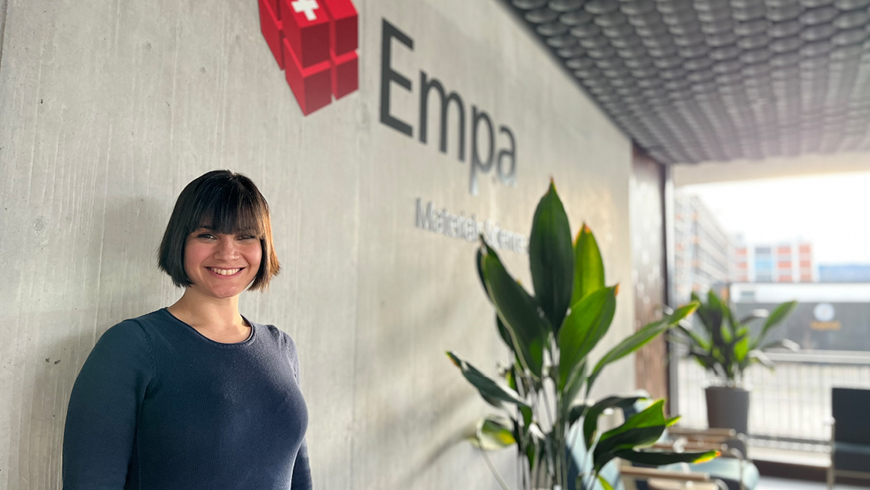
What have you achieved or particularly valued in your career so far and why did you decide to apply for feM-LEAD?
Throughout my career, I’ve had the privilege of working on innovative energy projects across a wide range of energy technologies and system scales. What I’ve enjoyed most is collaborating with diverse, multidisciplinary teams to co-create solutions that address both environmental and societal challenges. Leading international research partnerships, particularly in the Global South, has been especially rewarding and deepened my commitment to inclusive, systems-based approaches.
I applied to feM-LEAD to hone my leadership skills, strengthen my voice in shaping inclusive energy transitions, and connect with a community of women who are driving change in their fields. The program’s focus on mentorship and structural equity aligns deeply with both my professional goals and personal values.
What ambition, vision, motivation or new insight do you leave the feM-LEAD program with?
I’ve gained insights that have deepened my understanding of how essential diversity, equity, and inclusion are to effective leadership and thriving workplaces. This experience has renewed my commitment to fostering inclusive, systems-level change and strengthened my dedication to advancing equitable energy transitions. Now more than ever, I am convinced that we can only successfully tackle global challenges like climate change through multidisciplinary collaboration and diverse, inclusive leadership at every level.
Dr. Sandra Bürgi
Corporate Services
Phone +41 58 765 46 90
Dr. Paula de Navascués
Advanced Fibers
Phone +41 58 765 70 04
Dr. Barbara Putz
Mechanics of Materials and Nanostructures
Phone +41 58 765 62 54
Dr. Mashael Yazdanie
Urban Energy Systems
Phone +41 58 765 47 30
-
Share






